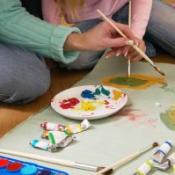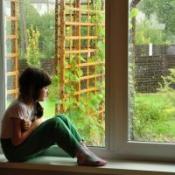Help! I’m Worried About My Child’s Aggressive Play
Dear GoodTherapy.org,
My 5-year-old is a generally happy and sweet kid, but I have been noticing lately that her play can get pretty violent. She can be aggressive sometimes and say things like, “Let’s pretend to punch each other.” When we play together, she wants there to be “good guys” and “bad guys” and have them fight—and sometimes kill—each other. She builds guns and other weapons with Legos and uses them to have fights with her toys, gleefully informing me when one or another of her toys “dies.”
Her dad and I don’t let her watch violent shows, so I don’t know where she is getting this—from other kids at school or from watching shows at her grandparents’ house, maybe? I’m worried whatever exposure she’s getting to weapons and violence is going to be harmful. I’ve tried to talk with her about it, but I’m not sure I’m using the right words. It’s really difficult for me to hear her play-act violence without saying anything, but I don’t want her to think she’s being “bad,” because I know she isn’t. How can I talk to her about this? —Puzzled Parent
Dear Puzzled Parent,
As a therapist, I want to let you know that this experience is common, and, actually, developmentally appropriate. As a parent, however, I remember being concerned myself when my happy (sheltered) kid started playing in this way. It may be that your daughter is hearing or watching kids on the playground, or perhaps has seen shows, but often it is hard to pinpoint a specific source of inspiration. Many kids, at some point, explore themes of aggression, violence, and death through their play.
I think in all of this it can be helpful to remember the true function of play. Children play to explore their world, to experience in fantasy things they might not experience in real life, and to try things out safely. It is not unusual for kids, particularly rule-following kids, to embrace the role of “bad guy” in their play. For young children who are not often in control of their world, what greater relief and excitement is there than to play-act as the ultimate rule-breakers? Also, children are naturally curious about life and death and how everything works. Play-acting the death of their toys is one way they process safely any fears or concerns they might have or try to make a big concept feel controllable.
The glee you describe in your little girl may simply be a reflection of the joy of being in complete control of her universe. She is all-powerful. How fun is that? As long as these impulses are expressed through play and not manifesting in aggressive, hurtful behavior beyond playtime, there is likely little to be concerned about.
There’s also a somewhat innate destructive urge that can be seen in any toddler on a beach relishing their demolition of a sand castle. The glee you describe in your little girl may simply be a reflection of the joy of being in complete control of her universe. She is all-powerful. How fun is that? As long as these impulses are expressed through play and not manifesting in aggressive, hurtful behavior beyond playtime, there is likely little to be concerned about.
You are right not to want her to think she is being “bad” by engaging in this play. One helpful approach is to express curiosity. For example, you might ask her why she wants to pretend to “punch each other.” You can engage in some complicated, choreographed, slow-motion “fights” that could actually be fun and enjoyable for both of you, while talking with her about why you would never actually harm each other in real life. You can also ask her what happens to a toy when it “dies” and explore her understanding of what that means. Asking her to tell you what it means to be a “bad guy” or a “good guy” can give you some insight into her developing sense of morality—and even if she chooses to be the “bad guy” in play, that doesn’t mean she actually embraces the dark side.
It is natural as a parent to worry about all that our children will be exposed to when they are not in our care, and yet, as they get older, more and more of their time will be spent beyond the walls of our homes. We can’t prevent them from hearing and seeing things we might not like. What we can do is equip them to handle their experiences. Ongoing conversations about what we believe is important, how we believe we should treat people, and what impact our words and actions have on others around us can help our children navigate the various messages they receive.
If your child remains generally happy, sweet, loving, and able to express empathy, it is likely she is using this play in healthy, developmentally appropriate ways. It is also likely a phase that will pass. If, however, you see some concerning behaviors going beyond the scope of play, you may want to consult with a child therapist to address those concerns. Your child’s teacher can also be a great source of information about how your daughter’s behavior at school compares with what you see at home, as well putting it in context with the other 5-year-olds in her school.
Best of luck,
Erika
- 7 comments
- Leave a Comment
Dakota
December 23rd, 2016 at 8:44 AMIf it is just play then I all out agree- let her be a kid and act out things as long as it is not hurting her or anyone else. I guess that there would be a time though when you might have to intervene if you found that another child is getting hurt as a result of the violent play.
Lennox
December 24th, 2016 at 4:03 PMIf it is simply play then I wouldn’t think that there would be any reason to be alarmed. I know that it can make some parents uncomfortable but I think that a lot of it has to do with the children testing their boundaries and how far they can go until it becomes something more than just play. I would keep an eye on it,make sure that it doesn’t get any more serious than that and take it from there.
Kymm
December 26th, 2016 at 1:47 PMworry more if they always let other kids push them around
Leave a Comment
By commenting you acknowledge acceptance of GoodTherapy.org's Terms and Conditions of Use.

 How ‘Helicopter Parenting’ May Be Helping Your Kids
How ‘Helicopter Parenting’ May Be Helping Your Kids  Is My Child Being Bullied? 6 Telltale Signs to Watch For
Is My Child Being Bullied? 6 Telltale Signs to Watch For  Secure and Elastic Attachment: Good Parenting Provides Both
Secure and Elastic Attachment: Good Parenting Provides Both 
